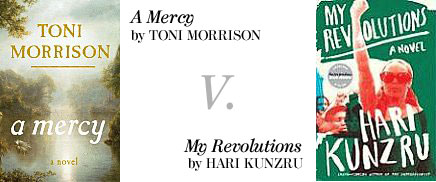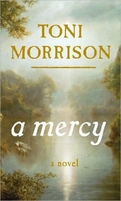
- This is Round 2, Match 4
- March 24, 2009
- Next Match
- Previous Match
The Tournament of Books is an annual battle royale between 16 of the best novels published in the previous year.
A new match is played here each weekday in March.
All titles 30% off at Powells.com
The Rooster on Facebook, and on Twitter
Previous years: 2008, 2007, 2006, 2005
Contact the Tournament staff:
talk@themorningnews.org

judged by John Hodgman
I realize it does not make sense. I went to college in the early ‘90s, when they were basically printing Beloved on the table tents in the dining halls in order to get you to read it.
I don’t quite know how I missed out, and by the time I was done with college I was working at a literary agency reading only unpublished novels—typically mean, joyless thrillers by lawyers who hated themselves, and/or 1,000-page-long imitation-beat novels, sent in banker’s boxes, wrapped up in duct tape, followed by threats. Enough of these, and you begin to distrust all novels, even the published kind. They all start feel a little wheedling, a little like a long con. A 200-page-plus letter from a usually deranged person who demands to be taken seriously and does not care about your time. It’s a sad attitude to have, but one that’s difficult to shake once it grabs you. And so there are holes in my literary education, one shaped just like Toni Morrison, and that’s what made this small internet contest suddenly a kind of reckoning.
And that’s why I read the Hanri Kunzru first. First, I don’t have to apologize for not having read him. He is younger and un-Nobel-ed, plus My Revolutions is wrapped around a boiling pot of a plot: a nice, prosperous, aged British hippie named Michael Frame turns out to have had a previous life as a William Ayers-like domestic terrorist. (In fact, the book is blurbed by Ayers, though it’s unclear whether this was before or after his demonization last fall. But I love how the quote just hisses there like a little bomb, beneath Time Out New York’s review and above The Evening Standard.)
The book begins with Frame realizing the gig is up (an old colleague from the bomb-making days invites him to lunch at the Soho Club); his current happy life begins to unravel, as his past gets conjured before him. And it is a sort of magic act, Kunzru’s virtuosic unveiling of radical London in the ‘60s, his detailed depiction of life in squats, his incredible knowledge of the various factions of leftist thought, their charismatic and loathsome and sexy leaders, and Frame’s plausible, awful transformation from long-haired leafleteer into a shaven-headed terrorist. It’s uncanny—it would be completely convincing as a hoax autobiography. And Kunzru reveals the hidden cards of his plot so deftly the book has motion even when nothing is really happening. And the truth is, it turns out nothing happens a fair amount in the book, especially at the end. Which would have been more of a problem had I not enjoyed it so much.
A novel is always a strange decision. It’s such a demanding, time-consuming way to tell a story, and few stories really earn the length or need it. The opera folk know how to keep people in the seats for hours for what amounts to a pretty basic revenge tale: give them lots of songs and scenery. Be generous enough to provide pleasure. Granted, my novel-reading experience is more traumatic than most, but it seems so many novelists forget this simple principle that I’m willing to forgive Kunzru almost anything for remembering it, for giving us some stemwinding scenarios and purely stunning literary word arias, even if the ending is kind of a dud. I was sure he was going to win.
Then it was time to read Toni Morrison’s A Mercy. It was everything I worry a serious novel will be. Somber and important. Meditative and evocative and poetic. The stuff back cover quotes are made of, but not necessarily a fun read. It is a short book, but big not only in its byline, but also in its subject: how slavery corrodes the lives of a 17th-century American homesteader, his wife, and the three indentured women whom he keeps but never fully admits he owns. What thin story there is exists only so that each character may illuminate every corner of sorrow in this arrangement. It is everything I worried it would be, and it is amazing.
One thing a novel can do better than almost anything else is to get inside a human’s head. That’s why there are so many bad stream-of-consciousness novels, and a few really good ones.
Like Kunzru, Morrison here summons a painful past so fully it is almost overwhelming. But rather than live within one person’s head, she possesses half a dozen with heartbreaking, intimate authenticity: African-born, English-born, half-Dutch, amnesiac, slave and free—Morrison alternates easily through all of their voices, from the slave Florens’s unmediated, unpunctuated first person to her master’s callously proper third. He’s casual in his sense of privileged destiny that he undertakes to build a grand, doomed mansion in the middle of the wilderness. It is as pointless and vainglorious and evil a construction as slavery itself, and it kills him, and undoes his family. Soon, his wife falls to smallpox, and Florens is sent into the wilderness to find the blacksmith who (maybe) can cure her—a free African whom Florens adores so much, every word she speaks in the novel is addressed to him.
To say Morrison made each narrator a fully realized character is a cliche. But through empathy, research, and sheer chops, she makes them human, and underscores the hardness of a time when so few of them would have been considered as such. Sure there isn’t much plot, but what movie could show what Florens feels when, lost in the wilderness, she is stripped and examined by the elders of a neighboring town, her dark skin so alien they think she is a demon? Sure, it’s not always fun to read, and I found Kunzru easier to turn back to. But in a way a short story can’t, the slow accumulation of these sad stories has a cathartic gravity. And unlike Kunzru, Morrison sticks the landing. She also wrote one of the most lovely lines I’ve ever read, as Florens gazes at the blacksmith, instantly smitten, though he does not yet know she exists: “Before you know I am in the world, I am already kill by you.”
So given that they’re both great books, does Morrison win on points? I guess so. But she also wins because, unlike many other novels I’ve had to read in the past, it can’t be anything else. It needs to be.
Today’s WINNER
A Mercy by Toni Morrison

About the Judge
From the Booth
| Since we’re at the end of Round Two let’s shake things up again. | Kevin | John | I’m glad to see that John Hodgman reminded everyone that before Battlestar Galactica he was indeed a literary agent. |
» Read Kevin Guilfoile & John Warner’s commentary on the match and leave a comment of your own «
The Standings
View the Brackets [PDF]
• Finals •
City of Refuge3 v. A Mercy1
judged by all judges + Amanda Hesser
• Round 1 •
26661 v. Steer Toward Rock4
judged by Brockman
Netherland2 v. A Partisan’s Daughter3
judged by Kate Schlegel
The White Tiger1 v. Harry, Revised4
judged by Jonah Lehrer
Unaccustomed Earth2 v. City of Refuge3
judged by Mary Roach
Shadow Country1 v. The Disreputable History of Frankie Landau-Banks4
judged by Anthony Doerr
The Lazarus Project2 v. The Northern Clemency3
judged by Monica Ali
A Mercy1 v. The Dart League King4
judged by Jonathan Eig
Home2 v. My Revolutions3
judged by Witold Riedel
• Round 2 •
26661 v. A Partisan’s Daughter3
judged by Maud Newton
Harry, Revised4 v. City of Refuge3
judged by David Rees
Shadow Country1 v. The Lazarus Project2
judged by C. Max Magee
A Mercy1 v. My Revolutions3
judged by John Hodgman
• Semifinals •
26661 v. City of Refuge3
judged by Liz Entman
Shadow Country1 v. A Mercy1
judged by Junot Díaz
• Zombie Round •
City of Refuge3 v. The Disreputable History of Frankie Landau-Banks4
judged by Rosecrans Baldwin

